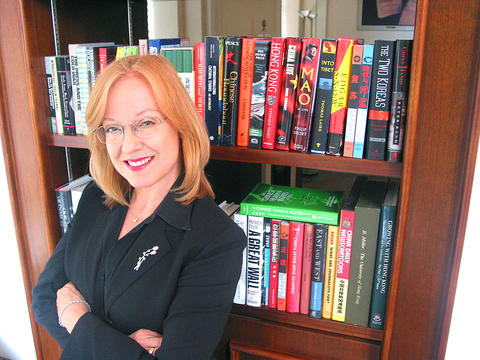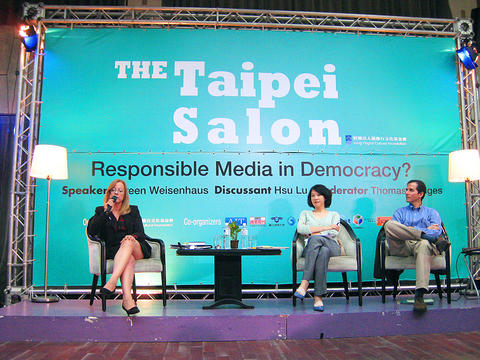On its front page, a newspaper shows images of a car crash in which a mayor's wife is badly injured; a TV reporter in cahoots with a local gangster who is threatening another gangster writes the story as an exclusive; an article accuses a government official of corruption, but cites an unnamed source - it turns out the information is untrue.
These are some examples of reporting that have given rise to criticism of Taiwan's media and accusations of titillation, innuendo and inaccuracy. The media's partisan polarization compounds the problem. And the recent growth in media outlets in Taiwan isn't matched by increased training of journalists, especially in ethics.
In a recent opinion piece, National Taiwan University journalism professor Flora Chang (張錦華) lamented journalism students' lack of interest in courses on ethics. "Media ethics is a wasteland in this country," she wrote.

PHOTO: COURTESY OF THE LUNG YING-TAI CULTUREAL FOUNDATION
Doreen Weisenhaus has a different take. In an interview with the Taipei Times the night before lecturing at the Lung Ying-tai Cultural Foundation (龍應台文化基金會), she suggested making the study of ethics mandatory for journalism students.
"If you don't make [ethics classes] mandatory then you are out of the norm - if you want to be an internationally ranked journalism school," she said.
Weisenhaus, who has worked as a reporter and editor at the New York Times, is now director of the Media Law Project at the Journalism and Media Studies Center at the University of Hong Kong.

PHOTO: COURTESY OF THE LUNG YING-TAI CULTUREAL FOUNDATION
Ethics, she said, is among the least popular but most important classes for journalism students because it underlies a reporter's creditability. Although teaching ethics alone will not guarantee improved media, without it, improvement is impossible.
Before relocating to Asia, Weisenhaus, a law graduate, was editor-in-chief of the National Law Journal, where she led award-winning coverage of the death penalty and environmental racism. She was then appointed as the first editor to cover legal issues at The New York Times Magazine. After that she became city editor and oversaw criminal justice and the courts, labor and the workplace, local business, finance and immigration.
In 2000, she took a one-year leave of absence to help train students throughout Asia to work for the local and international press, and to raise international standards of reporting.
What began as a one-year sabbatical turned into a seven-year stay in Hong Kong. In her book, Hong Kong Media Law: A Guide for Journalists and Media Professionals, she highlights media issues such as defamation, court reporting, access to information, official secrets, reporting restrictions, and more. It is a ground-breaking resource for journalists interested in reporting and law in Hong Kong and China.
Her time spent in Hong Kong made her realize that the region is developing the way "Eastern Europe was 15 years earlier."
She said the explosion of political, cultural, legal development was "just too tasty to pass up."
In addition to the momentous changes of Asia's politics and law, Weisenhaus cites two issues that compelled her to remain in Hong Kong.
The first was SARS. "Often, media can be tested by major events and they rise to the challenge and become more responsible," Weisenhaus said. But by all accounts the media failed in its duty to inform citizens about the disease because Beijing withheld crucial information.
"It was a ghost town," Weisenhaus said, referring to the streets of Hong Kong, "you couldn't go anywhere."
The failure of the local media to inform its citizens of the potential danger of SARS left many wondering if the Hong Kong's media could function adequately under the new system, but Weisenhaus says the media has become more sophisticated in tackling sensitive issues, such as their coverage of Hong Kong's controversial Article 23. The proposed law would prohibit acts of subversion against the Chinese government or theft of state secrets. It would also ban political organizations in Hong Kong from having contact with similar groups abroad. Critics said it would silence political opponents and muzzle the press.
This proposed law led to the large protests in Hong Kong in 2003, and was the other reason Weisenhaus remained in Hong Kong.
To her, it was an opportunity to modernize and liberalize Hong Kong's notoriously secretive security laws - a holdover from its colonial past. Instead, the laws became harsher.
"That galvanized Hong Kong in so many ways and so you start to see incredible stories in papers - [Hong Kong-run] Apple Daily (蘋果日報) as well as Mingpao (明報)- trying to explain legal concepts to people and doing a very good job of it … because they felt it was necessary. It was important, to explain these concepts. When July 1, 2003 came around, nobody expected 500,000 people to join in the protests," she said.
Weisenhaus says that Hong Kong's media was instrumental in galvanizing citizens to take to the street to protest against the law, with Jimmy Lai's (黎智英) Apple Daily going so far as to print large posters that protesters could carry during the march.
Weisenhaus recognizes that Lai's brand of reporting gossip often veers away from responsible media coverage, but on the other hand, "If you are not reporting what is important to the citizenry in a general sense," she said, "you are isolating your readership, which is bad for business."
She added that even a liberal publication like the New York Times tries "to have at least one or two conservative columnists." In light of that, Weisenhaus suggests that Taiwan's newspapers can expect a continued decline in readership if they proceed along partisan lines.
"In the end, you need to serve your community and if your community is a young democracy, or trying to be a democracy, or an aging democracy like the US," she said, "it really is the duty of the media to respond to that, but at the same time find some kind of financial success."

On April 26, The Lancet published a letter from two doctors at Taichung-based China Medical University Hospital (CMUH) warning that “Taiwan’s Health Care System is on the Brink of Collapse.” The authors said that “Years of policy inaction and mismanagement of resources have led to the National Health Insurance system operating under unsustainable conditions.” The pushback was immediate. Errors in the paper were quickly identified and publicized, to discredit the authors (the hospital apologized). CNA reported that CMUH said the letter described Taiwan in 2021 as having 62 nurses per 10,000 people, when the correct number was 78 nurses per 10,000

As we live longer, our risk of cognitive impairment is increasing. How can we delay the onset of symptoms? Do we have to give up every indulgence or can small changes make a difference? We asked neurologists for tips on how to keep our brains healthy for life. TAKE CARE OF YOUR HEALTH “All of the sensible things that apply to bodily health apply to brain health,” says Suzanne O’Sullivan, a consultant in neurology at the National Hospital for Neurology and Neurosurgery in London, and the author of The Age of Diagnosis. “When you’re 20, you can get away with absolute

When the South Vietnamese capital of Saigon fell to the North Vietnamese forces 50 years ago this week, it prompted a mass exodus of some 2 million people — hundreds of thousands fleeing perilously on small boats across open water to escape the communist regime. Many ultimately settled in Southern California’s Orange County in an area now known as “Little Saigon,” not far from Marine Corps Base Camp Pendleton, where the first refugees were airlifted upon reaching the US. The diaspora now also has significant populations in Virginia, Texas and Washington state, as well as in countries including France and Australia.

May 5 to May 11 What started out as friction between Taiwanese students at Taichung First High School and a Japanese head cook escalated dramatically over the first two weeks of May 1927. It began on April 30 when the cook’s wife knew that lotus starch used in that night’s dinner had rat feces in it, but failed to inform staff until the meal was already prepared. The students believed that her silence was intentional, and filed a complaint. The school’s Japanese administrators sided with the cook’s family, dismissing the students as troublemakers and clamping down on their freedoms — with